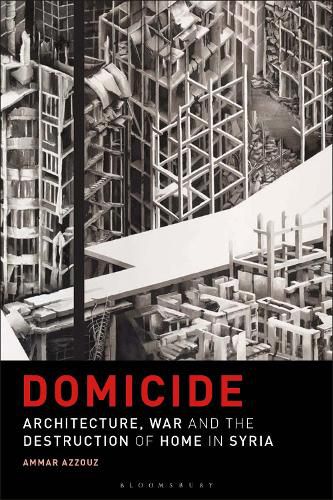Readings Newsletter
Become a Readings Member to make your shopping experience even easier.
Sign in or sign up for free!
You’re not far away from qualifying for FREE standard shipping within Australia
You’ve qualified for FREE standard shipping within Australia
The cart is loading…






Domicide = the systematic and deliberate killing of home.
So much architectural response to war has focused on 'cultural heritage', the destruction of infrastructure, and of ancient architecture - here, Ammar Azzouz moves the focus somewhere more personal: the home. In Domicide, he uses the notion of the 'home' - his native city of Homs in Syria - to address the destruction of cities and the displacement of people both externally and internally during times of war, and to explore how cities can be rebuilt without causing further damage to the communities that live there.
Drawing on interviews with built environment professionals, the book also offers insights from those from other professions who were forced to become 'architects' as they rebuilt their homes by themselves; showing how they cope, resist and carry on in long-term conflicts, beyond the dramatic moments of destruction shown in the news.
Focusing on Syria, but offering a blueprint for other urban areas of conflict across the wider world, Domicide offers fresh insights into the role of the architect during time of war, and explores how the future reconstruction of cities should mirror the wants and needs, the traditions and ways of living, of local communities. This book is essential reading for researchers in architecture, urban planning, heritage studies and conflict studies.
$9.00 standard shipping within Australia
FREE standard shipping within Australia for orders over $100.00
Express & International shipping calculated at checkout
Domicide = the systematic and deliberate killing of home.
So much architectural response to war has focused on 'cultural heritage', the destruction of infrastructure, and of ancient architecture - here, Ammar Azzouz moves the focus somewhere more personal: the home. In Domicide, he uses the notion of the 'home' - his native city of Homs in Syria - to address the destruction of cities and the displacement of people both externally and internally during times of war, and to explore how cities can be rebuilt without causing further damage to the communities that live there.
Drawing on interviews with built environment professionals, the book also offers insights from those from other professions who were forced to become 'architects' as they rebuilt their homes by themselves; showing how they cope, resist and carry on in long-term conflicts, beyond the dramatic moments of destruction shown in the news.
Focusing on Syria, but offering a blueprint for other urban areas of conflict across the wider world, Domicide offers fresh insights into the role of the architect during time of war, and explores how the future reconstruction of cities should mirror the wants and needs, the traditions and ways of living, of local communities. This book is essential reading for researchers in architecture, urban planning, heritage studies and conflict studies.